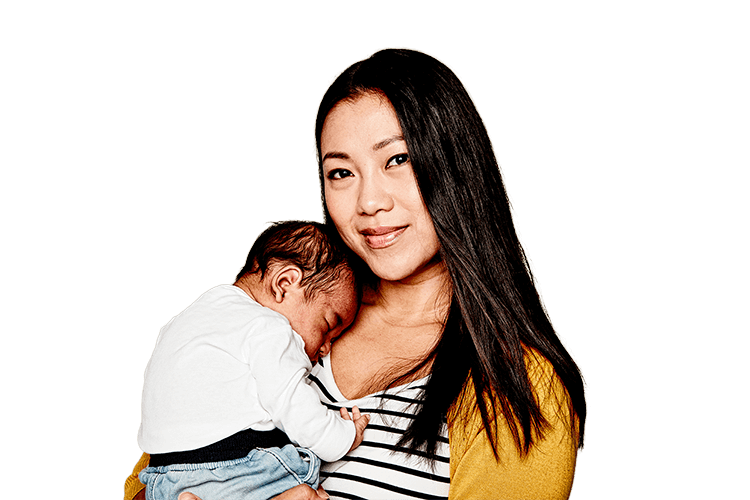Unsurprisingly, growing a new human can take its toll. From the moment you conceive to the realisation you’re heading into labour, your body is on its own odyssey to motherhood. There will be lots of new sensations that you’ll naturally adjust to, with some more painful than others.
Read on to learn more about the most common aches and pains while you grow your little resident, and some strategies to help soothe them.

Aches and pains you can expect
Leg cramps
Many pregnant women experience cramps in the foot, thigh and calf muscles. It’s still not clear what causes cramps during pregnancy, but there are a number of theories, including carrying extra weight, electrolyte imbalances and inactivity. They typically strike at night (just when you’re really loving that linen and pillow), and are best soothed by a little massage or walk.
Lower back pain
It’s also common to experience lower back pain (surprise surprise, that added person you’re carrying is quite the heavy lift!). This pain is usually the result of ligaments in your body stretching to prepare for labour.
Pelvic pain
A third common pain you may experience is in your pelvic region. This is commonly referred to as ‘pelvic girdle pain’ and it’s estimated around one out of five pregnant women experience it to some degree. Pelvic pain is a result of misalignment or stiffness in the joints at the front or back of your pelvis. Added to this, your little resident takes up space, which changes your posture and affects the way your pelvic joints work.
Strategies to manage pains and aches (and turn your living room into a massage parlour)
There are a range of things you can do to help soothe aches and pains that you confront throughout your pregnancy. Like lots of changes we experience in life, it’s important to recognise that this is a unique period of your life and you will adjust. Below are tips to help you get through:
Get movin’
Pregnancy is not the time to climb Mount Buller, or start training for an ultra-marathon, but there is certainly no harm in going for a stroll or brisk walk. Light exercise during pregnancy has a range of benefits – it can help reduce back and pelvic pain, improve circulation and posture. improve circulation.
Put your feet up when relaxing
When lying down, put your feet up on a pile of cushions. Elevating your lower legs will not only have a relaxing effect, it will also help you decrease risks of swelling while improving blood flow.
Immerse yourself in water
Be it a swimming pool or some aquarobics, immersing yourself in water will help ease the load on your body. It will also help you to relax your mind while minimising the sensation of weight on your lower back.
Apply heat or cold to areas of pain
Try using a warm pack on areas of the body that are sore or tender. If you’re experiencing pelvic pain, however, try a cold pack instead.
Empower (persuade) your hubby to be your in-house masseuse
Receiving a light massage when you are expecting is a great way of locating different pressure points and easing the build-up of tension in your muscles. It’s also a welcomed excuse for some intimate bonding with your partner.
If you find your pain persists, discuss with your GP or midwife.
Red flags and when to seek help
While you can expect the aches and pains during pregnancy, there are some instances where you should seek help. If you start to experience pelvic pain, an early diagnosis and treatment can help to keep pain to a minimum going forward. If back pain or leg cramps are severe, persistent or affecting your ability to function on a day-to-day basis, it’s a good idea to speak to your doctor or midwife.
There are also signs that might suggest that a more serious complication or condition. These include, but are not limited to:
- Vaginal bleeding
- Severe stomach pain
- Persistent pain in the same area
- A high temperature
- Vomiting that will not stop
- Vision loss or blurred vision
- Widespread itching of the skin
- Sudden swelling of face, hands and feet.
Where to seek help
If you experience severe pain or recognise any of the above signs or symptoms listed above, you should contact either your local GP, your obstetrician or your maternity hospital. In an emergency, you should call 000 for an ambulance.
Need a little extra support?
Health Concierge
Eligible members with hospital cover can now talk to a member of our Health Concierge team for advice and guidance on how to have a healthy pregnancy, at no extra cost on 1800 789 414.#
Got a health question? 24/7 Medibank Nurse Support
Medibank health insurance members can chat to a registered nurse over the phone or online to discuss any health questions or concerns at no extra cost.~ Chat online or call 1800 644 325 24 hours a day, 7 days a week.
24/7 Medibank Mental Health Support
Medibank members with health insurance can talk with a mental health professional over the phone or online in relation to any mental health or emotional concern at no extra cost.~ Log in or call 1800 644 325, 24 hours a day 7 days a week.
Looking for something else?
Visit Medibank Planning, Pregnancy and Parenting for a range of tools and advice to help you at every stage of your pregnancy journey.
Help the way you want it
Contact us
Call us on 134 190 to speak to a consultant. Alternatively, chat to us 24/7 online.
Self-service options
Login to MyMedibank or Download the MyMedibank App for self service options.
Find a specialist
Find a specialist or Member's choice hospital using our find a provider tool.

Things you should know
~ Some referred services may involve out of pocket costs and waiting periods may apply.
# Health Concierge is available to all eligible Medibank members who hold hospital cover. Excludes Overseas Visitor Health Cover, Working Visa Health Cover and Overseas Student Health Cover (OSHC). Some referred services may involve out of pocket costs.
While we hope you find this information helpful, please note that it is general in nature. It is not health advice, and is not tailored to meet your individual health needs. You should always consult a trusted health professional before making decisions about your health care. While we have prepared the information carefully, we can’t guarantee that it is accurate, complete or up-to-date. And while we may mention goods or services provided by others, we aren’t specifically endorsing them and can’t accept responsibility for them. For these reasons we are unable to accept responsibility for any loss that may be sustained from acting on this information (subject to applicable consumer guarantees).